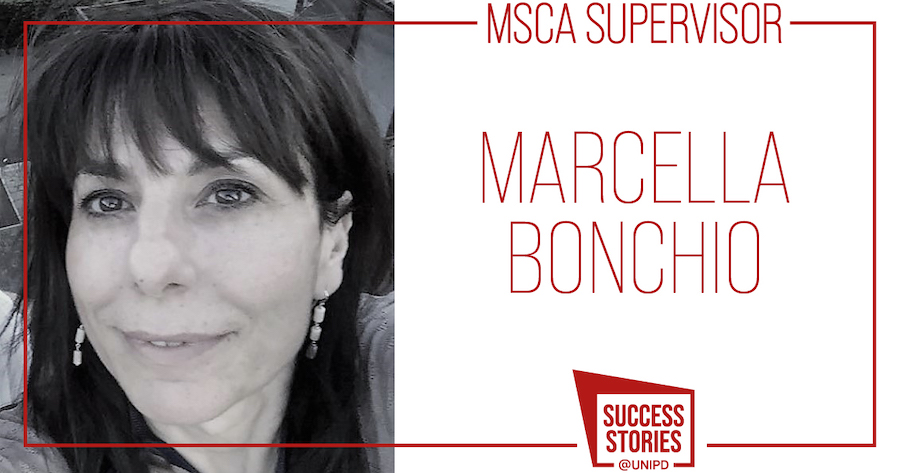
MSCA Supervisor: Marcella Bonchio
What does it take to become a successful researcher and a charismatic supervisor? What motivation and goals should fuel your research work?
Marcella Bonchio, full professor of Organic Chemistry and MSCA-IF Supervisor at the University of Padova, tells us about her international career path and the qualities a researcher should cultivate: “restless curiosity, passion and patience teach you how to enjoy success and how to appreciate failures”.

Marcella Bonchio started her career at the University of Padova where, in 1993, she received the PhD in Physical Organic Chemistry. Since 2001 she has been First Researcher of the Italian National Research Council (CNR), directing the research activities at the Institute of Membrane Technology section of Padova. Since 2013 she is Full Professor at the Department of Chemical Sciences of the University of Padova. As of 2015, she is Vice-Rector for research strategies at UniPd and participates in the Board of Trustees of the Venetian Institute of Molecular Medicine.
Marcella Bonchio has been supervising two MSCA Fellows, Elisabetta Benazzi with a project about Nitrogen activation and reduction using solar energy and Deepak Singh, who will work on photocatalytic small molecule activation and synthesis of bioactive molecules and one MSCA Seal of Excellence @UNIPD fellow, Alberto Vega Penaloza.
Interview:
Prof. Marcella Bonchio, you have spent several years abroad, in the US, before landing at the University of Padova. Could you tell us something about your research path?
I was a Chemistry student at the University of Padova, and in my Master’s final year, I joined the organic chemistry section led by Prof. Giorgio Modena. At that time Prof. Modena was one of the most famous Italian Chemists, he was known world-wide for his visionary approach, charisma, determination and courage. I was fascinated by the “big questions” that Prof. Fulvio Di Furia, a young full professor in the team, was presenting during the Advanced Organic Chemistry class that I was attending meanwhile. Participating every day in the research activities of the group was real fun. I cannot forget that all the group members were asked to participate to these long-lasting research group meetings: they could last even more that one day, with brief interruptions, until all the answers were found. As a Master student at the very beginning I was feeling inadequate most of the times, but I was absorbing all the “qualities” that are needed: restless curiosity, passion and patience, how to enjoy success and how to appreciate failures. I absorbed these as resources to push forward our limits. Last but not least, in our group in those early times, there was a nice gender balance and I was working and learning under the direct supervision of Valeria, with whom we still share unforgettable memories. Valeria Conte is now a Full Professor of Chemistry at the University of Rome Tor-Vergata, where she directs the Department of Chemical Sciences.
With all this in my heart, I accepted the opportunity to be a visiting PhD student at Brown University (RI, USA), and later-on I was very happy that my post-doctoral application at Princeton (NJ, USA) was accepted by John T. Groves, one major leader in the field of bio-inspired catalysis for energy and life sciences. I was still in the US when I decided to apply for a position as CNR (Consiglio Nazionale delle Ricerche) researcher in Padova and... Here I am, since 2013 I am Full Professor at the Department of Chemical Sciences in Padova, and since 2015 I have the honour to serve my University as Vice-Rector for Research Strategies. This is a long journey, not without difficult times, but in which I still enjoy the privilege of continous learning.
What are the main research projects you are currently carrying forward?
Our inspiration comes from the fantastic complexity of the Natural Machinery that powers our life every day. In our group, we look for new molecules, pigments, catalysts, materials that can be Game Changers for Artificial Photosynthesis. Our effort is dedicated to understanding the fundamental principles of solar energy storage to be applied with man-made systems, so to produce clean fuels, renewable materials, green synthetic methods. We believe that our Future will be strongly based on next-generation chemicals. The way to conceive and design these new processes and chemicals will be rooted in what we are learning from Nature, thus respecting our Earth since the very main fundamentals.
We are now involved in a National Project focusing on water splitting and CO2 reduction, while two MSCA fellowships, that have been recently approved, deal with Nitrogen activation and reduction using solar energy and CO2 photofixation
You have led several research projects. What tips would you share with a researcher who is thinking of applying for an international research project?
The first and main “GO-for-it” green light comes easily: you should love your idea as if it were the one idea that the world is expecting from you, and that you cannot hide any longer, you have to share your great dream with the entire world. So, my advice is not technical, you can find the first tip straight into your soul, it’s inside you, it’s your great dream. Don’t go for anything less.
Once you find it, you will have to write it down into a successful proposal. Well, here you have to be professional and ask for help. Share your ideas with us at the University of Padova, we will work together to make it real
You have been supervising many PhD and Post-Doc projects, including some MSCA Individual Fellowship winners. What do you and your lab have to offer to an early career researcher?
We will share our passion and commitment to save the world! In doing this, we will share our state-of-the-art laboratories, instrumentation and knowledge. I think that what we can transfer is a deep attitude towards critical thinking and a restless attitude to go beyond borders and contaminate our “comfort zone”, creating a new space where chemistry meets biology, materials science and photonics.
Your research has many potential applications. Is the synergy between theoretical and applied research an important aspect for a project submission in your field?
Absolutely. Let me say that I would rather use the term “Frontier Research”. This is the new definition by ERC, that goes beyond fundamental and applied research. This means the kind of research that is committed to change the life of people and make it better.
International Research Office
via Martiri della libertà 8, 35137 Padova, Italy
tel. +39 049.827 1947 / 1948 / 1945
fax +39 049.827 1911
international.research@unipd.it


